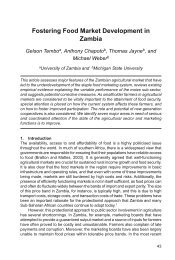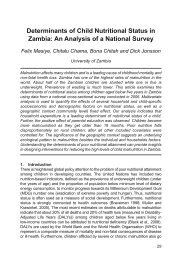Introduction to Basic Legal Citation - access-to-law home
Introduction to Basic Legal Citation - access-to-law home
Introduction to Basic Legal Citation - access-to-law home
Create successful ePaper yourself
Turn your PDF publications into a flip-book with our unique Google optimized e-Paper software.
(3) an index of all authorities referred <strong>to</strong>, classified by cases (alphabetically arranged and with<br />
complete citations), constitutional and statu<strong>to</strong>ry provisions, texts, treatises, and other<br />
authorities, and indicating the pages of the brief where the authorities are cited. <strong>Citation</strong>s are<br />
<strong>to</strong> be in the form prescribed by the Oregon Appellate Courts Style Manual. Reference <strong>to</strong><br />
"passim'' or ''et seq.'' in the index of authorities is discouraged.<br />
Note: The Oregon Appellate Courts Style Manual (2002),<br />
http://www.<strong>law</strong>.cornell.edu/state_samples/OR_Style_Manual_2002.pdf, lays out distinctive<br />
citation conventions for a full range of legal authority.<br />
Pennsylvania: Supreme Court citation practice | <strong>Citation</strong> rule(s)<br />
><br />
Contents | Index | Help | < |<br />
Examples from Commonwealth v. Beam, 567 Pa. 492, 788 A.2d 357 (2002)<br />
. . . .<br />
Following a hearing, the common pleas court denied the request for preliminary injunction<br />
and, on Beam's motion, granted summary judgment in his favor and dismissed the<br />
Department's complaint. The Department appealed, and the Commonwealth Court affirmed.<br />
See Commonwealth, Dep't of Transp. v. Beam, 756 A.2d 1179 (Pa. Cmwlth. 2000). In their<br />
reasoning, the reviewing courts focused on the Department's capacity <strong>to</strong> seek injunctive relief<br />
in a judicial forum. While recognizing that the Department's enumerated powers included the<br />
authority <strong>to</strong> issue airport licenses, see 74 Pa.C.S. § 5301(b)(1), and that its regulations<br />
establish procedures for license revocation and suspension, see 67 Pa. Code § 471.3(g), the<br />
courts nevertheless found no statute or regulation conferring authority <strong>to</strong> commence a civil<br />
action. Stressing the precept that an agency charged with the administration of a statute can<br />
act only within the strict confines of that statute, and therefore can seek <strong>to</strong> enforce compliance<br />
only with specific legislative authorization, the Commonwealth Court and the common pleas<br />
court concluded that the Department bore airport licensing enforcement responsibility but<br />
presently lacked the means by which <strong>to</strong> compel compliance. See 756 A.2d at 1181-82. We<br />
allowed appeal <strong>to</strong> consider this conclusion.<br />
. . . .<br />
This Court has long adhered <strong>to</strong> the precept that the power and authority exercised by<br />
administrative agencies must be conferred by legislative language that is clear and<br />
unmistakable. See United Artists' Theater Circuit, Inc. v. City of Phila., 535 Pa. 370, 389, 635<br />
A.2d 612, 622 (1993) ("A doubtful power does not exist." (citations omitted));<br />
Commonwealth, Dep't of Envtl. Resources v. Butler County Mushroom Farm, 499 Pa. 509,<br />
513, 454 A.2d 1, 3 (1982). At the same time, we recognize that the General Assembly has<br />
prescribed that legislative enactments are generally <strong>to</strong> be construed in such a manner as <strong>to</strong><br />
effect their objects and promote justice, see 1 Pa.C.S. § 1928(c), and, in assessing a statute,<br />
courts are directed <strong>to</strong> consider the consequences of a particular interpretation, as well as other<br />
226




